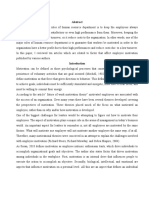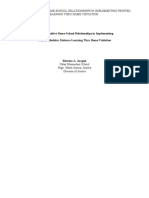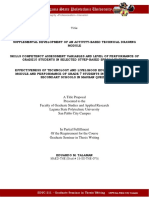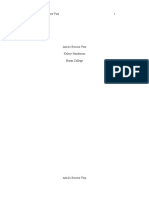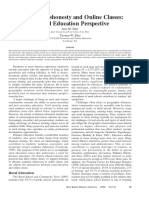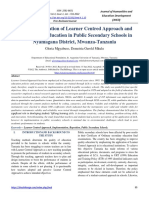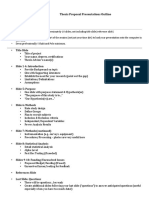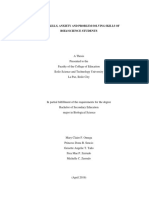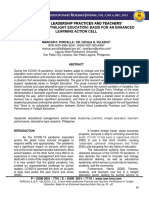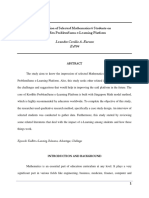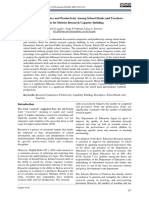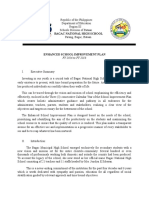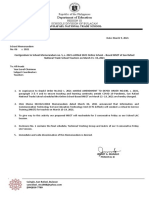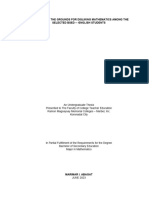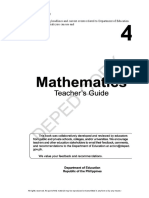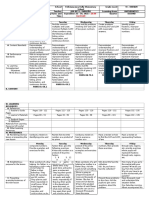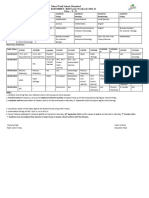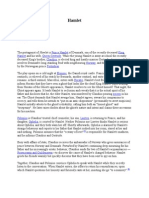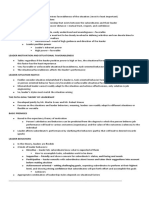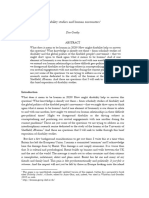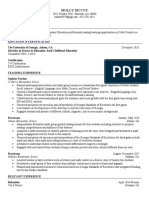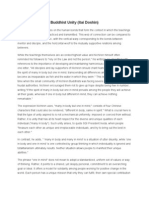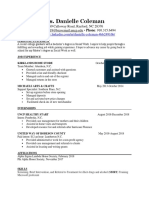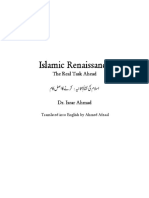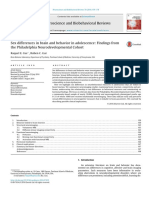DEFINITIONS OF RESEARCH
Research is a process of steps used to collect and analyze
information to increase our understanding of a topic or issue. It
consists of three steps: Pose a question, collect data to answer the
question, and present an answer to the question. Creswell, J. W. (2008)
GENERAL CHARACTERISTICS OF RESEARCH
The following characteristics may be gathered from the
definitions of Research
1. It gathers new knowledge or data from primary or first-hand sources.
2. It places emphasis upon the discovery of general principles.
3. It is an exact systematic and accurate investigation.
4. It uses certain valid data gathering devices.
5. It is logical and objective.
6. The researcher resists the temptation to seek only the data that
support his hypotheses.
7. The researcher eliminates personal feelings and preferences.
8. It endeavours to organise data in quantitative terms.
9. Research is patient and unhurried activity.
10. The researcher is willing to follow his procedures to the conclusions
that may be unpopular and bring social disapproval.
11. Research is carefully recorded and reported.
12. Conclusions and generalisations are arrived at carefully and
cautiously.
THE FUNCTIONS OF RESEARCH
The refinement of existing knowledge or the acquisition of new
knowledge is essentially an intermediate step toward the improvement
of the social studiesal process.
�The social studiesal improvement is associated with various
aspects of Social Studies:
(a) The function of research is to aid to making a decision
concerning the refinement or extension of knowledge in this
particular area.
(b) The function of research is to improve the students learning
and classroom problem with which teacher is encountering with
problems. The more effective techniques for teaching can be
developed.
(c) Another function of research is to aid social studiesal
administrators to improve the Social Studiesal systems.
OBJECTIVES OF RESEARCH
The research has the following three objectives:
1. Theoretical objective
2. Factual objective and
3. Application objective.
1. Theoretical Objective. Those researches whose objectives are
theoretical formulate the new theories, principles or laws. Such type of
research is explanatory because it explains the relationships of certain
variables. These researches contribute some basic knowledge to the
human knowledge. The researches in different disciplines i.e., Physics,
Chemistry, Mathematics etc. have the theoretical objective.
2. Factual Objective. Those researches whose objective is factual
find out new facts. This objective is by nature descriptive. These
researches describe facts or events which happened previously. Such
type of research is done in history
�3. Application Objective. The research having application objective
does not contribute a new knowledge in the fund of human knowledge
but suggests new applications. By application we mean improvement
and modification in practice. For example if anyone gives a new
application of electricity then such type of research has application
objective.
IMPORTANCE OF THE STUDY
Estolas, et. al. (1995, p. 178) emphasized the importance of the study
as the part of the research which justifies the launching of the research
project. It is in this section where the researcher expresses his
persuasion about the value of the study so as to get the approval of
the screening and approving committee. The importance of the study
should contain the following:
1. Contribution to the accumulation of knowledge or to filling up a
knowledge gap;
2. Contribution to building, validating or refining theories;
3. Finding a solution to a problem of a specific group or improving
certain conditions;
4. Contribution to improve education, income, health, inter-relations,
and the like.
SCOPE AND DELIMITATION OF THE STUDY
Scope and delimitations comprise one important section of a research
paper.
Scope
The scope defines the coverage or boundaries of the study in terms of
the area or locality and subjects, population covered the duration or
�period of the study. The nature of variables treated, their number, and
treatments they received, and instruments or research design should
be so stated.
Delimitation
Delimitations are those conditions beyond the control of the researcher
that may place restriction on the conclusions of the study and their
application to other situations. Administrative policies that preclude
using more than one class in an experiment, a data-gathering
instrument that has not been validated, or the inability to randomly
select and assign subjects to experimental and control groups are
examples of limitations. Stating the study limitations not only provides
extra credence to the study but also provides the reader caution not to
expect beyond what the study can and promises
�Chapter 2
Review of Related Literature and Studies
The literature review consists of a collection of pertinent
readings, published or unpublished, in local or foreign settings. Sources
of related information and data are books, articles, pertinent
documents, speeches, programmes, theses, and other publications. All
empirical investigations should be built on previous knowledge taken
from these sources. (Ariola, 2006)
MEANING OF REVIEW OF LITERATURE
The phrase review of literature consists of two words: Review
and Literature. The word literature has conveyed different meaning
from the traditional meaning. It is used with reference to the languages
e.g. Hindi literature, English literature, Sanskrit literature. It includes a
subject content: prose, poetry, dramas, novels, stories etc. Here in
research methodology the term literature refers to the knowledge of a
particular area of investigation of any discipline which includes
theoretical, practical and its research studies.
The term review means to organize the knowledge of the
specific area of research to evolve an edifice of knowledge to show that
his study would be an addition to this field. The task of review of
�literature is highly creative and tedious because researcher has to
synthesize the available knowledge of the field in a unique way to
provide the rationale for his study. The very words review and
literature have quite different meanings in the historical approach. In
historical research, the researcher does much more than review
already published material; he seeks to discover and to integrate new
information which has never been reported and never considered. The
concept and process implied in the term review of literature have
such different meanings in historical as compared with survey and
experimental research.
The term review of literature has been defined in the following
ways:
According to Good, Barr and Scates
The competent physician must keep abreast of the latest discoveries
in the field of medicine. Obviously the careful student of education, the
research worker and investigator should become familiar with location
and use of sources of educational information.
According to W.R. Borg
The literature in any field forms the foundation upon which all future
work will be built. If we fail to build the foundation of knowledge
provided by the review of literature our work is likely to be shallow and
naive and will often duplicate work that has already been done better
by someone else.
According to Charter V. Good
The keys to the vast storehouse of published literature may open
doors to sources of significant problems and explanatory hypotheses
and provide helpful orientation for definition of the problem,
�background for selection of procedure, and comparative data for
interpretation of results. In order to be creative and original, one must
read extensively and critically as a stimulus to thinking.
According to John W. Best
Practically all human knowledge can be found in books and libraries.
Unlike other animals that must start a new with each generation, man
builds upon the accumulated and recorded knowledge of the past. His
constant adding to the vast store of knowledge makes possible
progress in all areas of human endeavour.
OBJECTIVES OF REVIEW OF LITERATURE
The review of literature serves the following purposes in conducting
research work:
1. It provides theories, ideas, explanations or hypothesis which may
prove useful in the formulation of a new problem.
2. It indicates whether the evidence already available solves the
problem adequately without requiring further investigation. It avoids
the replication.
3. It provides the sources for hypothesis. The researcher can formulate
research hypothesis on the basis of available studies.
4. It suggests method, procedure, sources of data and statistical
techniques appropriate to the solution of the problem.
5. It locates comparative data and findings useful in the interpretation
and discussion of results. The conclusions drawn in the related studies
may be significantly compared and may be used as the subject for the
findings of the study.
�6. It helps in developing experts and general scholarship of the
investigator in the area investigated.
7. It contributes towards the accurate knowledge of the evidence or
literature in ones area of activity is a good avenue towards making
oneself. This knowledge is an asset ever afterwards, whether one is
employed in an institution of higher learning or a research
organization.
Bruce W. Tuckman (1978) has enumerated the following
purposes of the review:
1. Discovering important variable.
2. Distinguishing what has been done from what needs to be done.
3. Synthesizing the available studies to have perspective.
4. Determining meanings, relevance of the study and relationship with
the study and its deviation from the available studies.
Edward L. Vockell (1983) has pointed out the following two
purposes:
The main purpose of this review is to put the hypothesis to be
examined in the research report into its proper context.
Secondary purposes of this part of the report are to provide readers
with guidelines regarding where they can look to find more information
and to establish the authors credential by letting readers know that
the researcher is aware of what has been going on with regard to the
current and related topics. The review of literature provides some
insight regarding strong points and limitations of the previous studies.
It enables him to improve his own investigation.
�PRINCIPLES AND PROCEDURES FOR THE REVIEW OF
LITERATURE
The following is the specific procedure through which review can be
done appropriately:
1. It is generally advisable to get first and over all view by consulting a
general source, such as a text-book which is more likely to provide the
meaning and nature of the concepts and variables or theoretical
framework of the field. The logical starting point is to get a clear
picture of the problem to be solved. A text-book usually provides the
theoretical aspects of the problem. It is very essential to develop deep
understanding about the variables and the field.
2. After developing the insight about the general nature of his problem,
the investigator should review the empirical researches of the area.
The best reference for this phase is the handbook of research.
Encyclopaedia of Educational Research, the Review of Educational
Research and International Abstracts for more upto-date findings. The
researchers major concern at this point should be to get a clear
picture of the field as a whole; specific details are important at this
stage. He should start from a topical outline and a temperature set of
classifications, so that whatever he reads can be made meaningful.
3. The research for library material must be systematic and thorough.
The investigator generally should start by collecting his references
from the educational index. When a large number of references are to
be copied, they should be typed because precision is required here.
4. The researcher should take note systematically in the light of such
criteria as uniformity, accuracy and ease of assembly. The notes should
be taken on the card. Each entry should be made separately;
references should be recorded with complete bibliographic data. It
�should be recorded on front side of the card and content should be
taken below and reverse side of it. Each note should be recorded
carefully and accurately.
5. The investigator should take as complete notes as he might need.
On the other hand, taking unnecessary notes is wasteful. The useful
and necessary material should be recorded precisely. It would be better
that similar sources are gathered. It is necessary that a general
education of each source, rather than simply a summary of its content
be made. Such evaluation is necessary both in presenting the study in
the review of literature, and in using the study as background for the
interpretation of the findings of the study.
6. A major pre-requisite for effective library work is the ability to read
at high speed. This can only be developed through practice. He must
learn to skim material to see what it has to contribute to the study,
only after its reference has been established, it should be read in
detail. Surveying the literature for the purpose of conducting research
is not just a pleasant excursion in the wonderful word of books, it is a
precise and exacting task of locating specific information for the
specific purpose.
7. The actual note-taking process is always a difficult task for the
researcher. He has to spend long hours in the library taking notes by
hand. It is a very tedious job and leads to importance to carelessness
and illegibility. He should make use of the facilities available in the
library for this purpose.
SOURCES OF REVIEW OF LITERATURE
There are various sources of literature which may be used for this
purpose. These sources can be broadly classified into these heads.
(1) Books and Text-Books material.
�(2) The Periodical literature, and
(3) General references.
1. Books and Text books
2. Periodicals
3. Abstracts
4. Encyclopaedias
5. Almanacs, Handbooks, Yearbooks and Guides
6. References on International Education
7. Specialized Dictionaries.
8. ERIC (Educational Research Information Centre)
9. Microfiche
10. Dissertations and Theses
11. Newspaper
THE FUNCTIONS OF THE REVIEW OF LITERATURE
There are five functions of review of literature :
1. The conceptual frame of reference for the contemplated research.
2. An understanding of the status of research in problem area.
3. Clues to the research approach, method, instrumentation and data
analysis.
4. An estimate of the probability of success of the contemplated
research and the significance or usefulness of the findings and,
assuming the decision is made to continue.
5. Specific information required to interpret the definitions,
assumptions, limitations and hypotheses of research.
�References
Aquino, Gaudencio. (1992). Fundamentals of Research. Mandaluyong
City: National Book Store.
Estolas, J & Daisy Boquiren ( 1995). Fundamentals of Research. Manila:
Miranda & Sons, Inc.
Jose F. Calderon and Expectacion Gonzales "Methods of Research and
Thesis Writing" published in 2003
http://www.cecftu.edu.vn/upload/TB/HuongdantrinhbayLVLA.pdf




